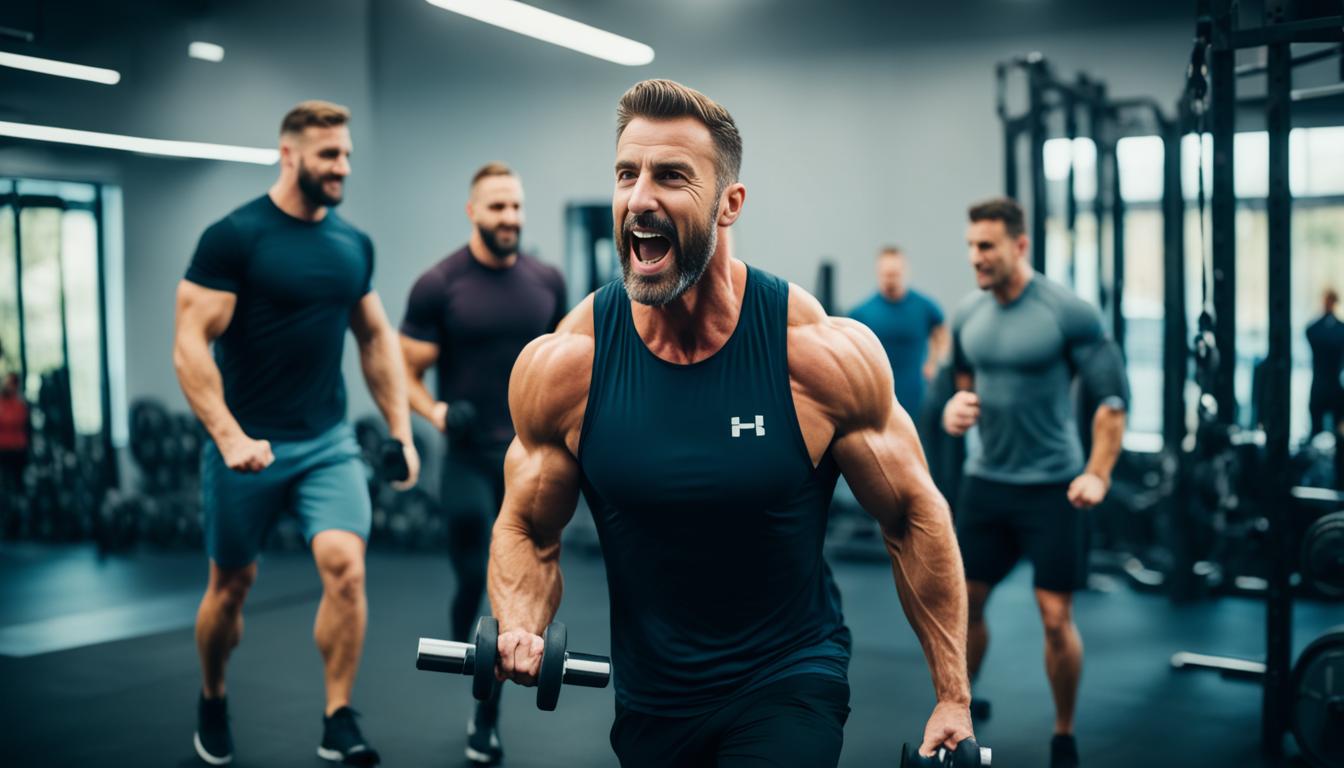
Did you know getting a perfect six-pack in a few weeks is not realistic for most? This fact shows our fitness journey is more than a quick fix. It’s about building habits that keep us motivated and healthy for the long run. In 2025, we focus on setting realistic fitness goals to keep our motivation high and support our wellness goals.
Staying motivated is key, and it’s not just about getting stronger. It’s also about boosting our mental strength and having a solid plan for success. We invite you to join us in this journey to better health and fitness. Together, we’ll face challenges, build mental toughness, and create a supportive environment for motivation.
Key Takeaways
- Setting specific, achievable fitness goals is crucial for sustainable motivation.
- Consulting a healthcare professional before starting a new exercise program ensures safety.
- Meal prepping helps in controlling portion sizes and ingredients for healthier eating.
- Finding support through workout buddies or fitness classes enhances accountability.
- Transitioning gradually from a sedentary to an active lifestyle can prevent injury.
- Personal trainers provide tailored plans and essential guidance to maintain motivation.
The Importance of Setting Realistic Fitness Goals
We start our fitness journeys full of excitement. But, success needs more than just motivation. Setting realistic fitness goals is key to our success. It shapes our approach and keeps us committed.
Clear goals help us deal with the challenges of fitness planning. They make sure our hard work leads to real results.
Identifying Your Fitness Objectives
Setting clear fitness goals gives us a chance to succeed. Goals like losing weight, gaining muscle, or improving health guide us. Without clear goals, we might feel let down or frustrated.
Let’s aim for specific, reachable goals. Planning our fitness journey starts with knowing what we want to achieve in a certain time.
Creating a Clear Path to Success
A good plan helps us track our progress. Breaking big goals into smaller steps lets us celebrate our wins and stay motivated. We know our goals might change, so being flexible is important.
Knowing how we’re doing keeps us committed to our fitness plans. This way, we truly connect with our fitness routines.
Effective Workout Routines to Boost Motivation
Finding the right workout routine can make our fitness journey better and keep us motivated. There are many effective routines for different goals and likes. Options like High-Intensity Interval Training (HIIT), strength training, and fun cardio help us stay engaged and excited about fitness.
High-Intensity Interval Training (HIIT)
HIIT is great for burning calories quickly, perfect for those with little time. It switches between intense activity and short breaks. Studies show it can lead to weight loss and better heart health with just a few sessions a week.
Strength Training Essentials
Strength training is key for building muscle and getting stronger. Aim for 1-3 sets of 12-15 reps per exercise, resting 30 to 90 seconds between sets. For muscle growth, do 3-6 sets of 6-12 reps with high intensity. Remember to rest for at least 48 hours to let muscles repair and grow. The CDC suggests doing strength workouts twice a week to cover all major muscle groups.
Cardio That You’ll Actually Enjoy
Choosing fun cardio options helps us stick with fitness for the long haul. Dancing, cycling, or group classes make working out a blast and build friendships. Adding music or podcasts to workouts makes them even more enjoyable. These activities boost our health and happiness, keeping us motivated.
| Exercise Type | Recommended Sets | Reps | Intensity |
|---|---|---|---|
| Muscular Endurance | 3-4 | More than 12 | Less than 67% of 1RM |
| Hypertrophy | 3-6 | 6-12 | 67%-85% of 1RM |
| Strength | 4-6 | Less than 6 | More than 85% of 1RM |
| Power Training | 3-5 | 1-5 | 75%-90% of 1RM |
By mixing these workout types, we can make a full fitness plan that keeps us motivated and consistent. Whether we’re into HIIT, strength training, or fun cardio, each step moves us closer to our fitness goals.
Overcoming Workout Plateaus for Continued Progress
We all hit bumps on our fitness paths, and workout plateaus can be tough. Knowing when we’re plateauing helps us find ways to move past them and stay motivated. When we stop making progress, it’s a sign we need to change our fitness plans. This means it’s time to look at how we’re doing things and find new ways to keep moving forward.
Recognizing the Signs of a Plateau
It’s key to know what our bodies are telling us. Signs you might be hitting a plateau include:
- Stagnation in muscle gain or weight loss
- Increased difficulty in completing previous workout routines
- Less enjoyment and enthusiasm towards workouts
Seeing these signs means it’s time to try new things to get our motivation back and break through the plateau.
Strategies to Break Through Plateaus
There are ways to beat workout plateaus. Here are some strategies to try:
- Change Workout Intensity: Making our workouts harder can help muscles grow. Try lifting heavier weights, resting less, or doing supersets to challenge yourself.
- Incorporate New Exercises: Trying new exercises keeps our muscles guessing. Exploring new moves can wake up muscles that have gotten too used to the same old routine.
- Utilize Progressive Overload Techniques: Slowly upping the challenge we give our bodies can push us further. This could mean lifting more, doing more reps, or working out more often.
Using these strategies helps us keep making progress and builds our resilience. Facing these challenges lets us see them as chances to refocus and get more determined. This keeps us committed to our fitness goals.
Workout Motivation for Men 2025: Mindset Matters
Building a strong fitness mindset is key to lasting motivation. Focusing on mental toughness helps us overcome tough workouts and setbacks. By using specific strategies, we grow our resilience and turn challenges into growth opportunities.
Developing Mental Toughness Training
Mental toughness training changes how we see fitness. It’s like a superhero cape that protects us from doubt and tiredness. Techniques like visualization, positive self-talk, and mindfulness build a strong mental base. They also boost our drive to reach our fitness goals. Like any muscle, discipline grows with regular use.
- Practice visualization daily, imagining your goals.
- Use positive affirmations to build confidence.
- Add mindfulness to workouts, focus on breathing and movements.
Creating an Empowering Mindset for Fitness
Having an empowering mindset keeps us motivated. We should remind ourselves of our strengths every day. Knowing we need 150 minutes of moderate exercise and two strength training sessions a week helps set realistic goals. Celebrating our small wins keeps us motivated to keep going.
“Discipline is the bridge between goals and accomplishment.” – Jim Ryun
| Exercise Type | Recommended Duration | Examples |
|---|---|---|
| Moderate-Intensity Aerobic | 150 minutes/week | Brisk walking, swimming |
| Strength Training | 2 sessions/week | Lunges, squats, push-ups |
| Vigorous-Intensity Aerobic | 75 minutes/week | Running, cycling |
| Muscle-Strengthening | 2 days/week | Weight lifting, resistance exercises |
With a growth mindset, we empower ourselves to break through barriers and achieve lasting change. Fitness lovers can mix discipline with effective methods to keep motivation high. This blend of mental toughness and a strong fitness mindset is key to reaching our goals.
Building Muscle Mass: The Science Behind It
Understanding how to build muscle mass helps us reach our fitness goals. Key parts like nutrition for strength training and recovery are crucial. Let’s explore what we need for a stronger body.
Nutrition for Muscle Growth
A balanced diet is key for muscle growth. Here are the main points to focus on:
- Macronutrient Ratios: Eat foods rich in proteins, carbs, and healthy fats. This helps with muscle repair and keeps energy up.
- Protein Intake: Eat 0.7 to 1 gram of protein for every pound of your weight. Good sources are chicken, fish, eggs, and beans.
- Hydration: Drinking enough water boosts performance and recovery. It’s a must for our diet.
The Role of Recovery in Muscle Development
Recovery is vital for gaining muscle. Rest and active recovery help our muscles repair and grow. Here are some tips:
- Sleep: Get 8-10 hours of good sleep each night to help with recovery.
- Rest Days: Make sure to take regular rest days to avoid overtraining and help muscle healing.
- Active Recovery: Do low-intensity activities like walking or yoga to improve blood flow and aid recovery.
Incorporating Healthy Lifestyle Habits into Your Routine
Embracing a holistic approach to fitness can make a big difference in our health journey. By adding healthy habits to our daily life, we lay a strong foundation for success. This means focusing on workouts, nutrition, hydration, sleep, and recovery.
The Importance of Nutrition and Hydration
Feeding our bodies right is key for top performance and health. With most New Year’s resolutions failing early on, it’s key to make lasting dietary changes. Here are some tips:
- Eat more plants to get more nutrients and stay healthy.
- Reduce sugar in drinks like sodas and energy drinks to follow dietary guidelines.
- Try to eat 1.5–2 cups of fruit and 2–3 cups of veggies every day.
Cooking at home lets us choose healthier foods and control what we eat. Drinking enough water helps our brain work better and keeps us energetic.
Sleep and Recovery: Underrated Aspects of Fitness
Good sleep is crucial for recovery and affects our mood and muscle strength. Getting 7-9 hours of quality sleep each night boosts our physical and mental skills. As we get older, losing muscle mass and strength starts, so rest is key. Here are ways to recover well:
- Take rest days to let muscles heal.
- Use meditation to lower stress hormones and prevent fat gain.
- Enjoy your wins to stay motivated and keep up good habits.

Adding these habits to our life creates a balanced routine. It helps us improve steadily and reach our fitness goals. By focusing on eating well, drinking enough water, and resting, we boost our health and set up a path to lasting wellness.
| Healthy Habits | Benefits |
|---|---|
| Proper Nutrition | Supports energy levels and overall health |
| Hydration | Aids cognitive function and physical performance |
| Quality Sleep | Enhances muscle recovery and mental clarity |
| Regular Exercise | Slows muscle mass loss and promotes cardiovascular health |
Age-Defying Exercise Tips for Men
As we age, it’s crucial to keep up our strength and vitality through exercise. Doing age-defying exercises keeps us feeling young and flexible. Let’s look at key exercises for staying strong and how to adjust our routines as we get older.
Exercises to Maintain Youthful Strength and Flexibility
Doing a mix of exercises keeps us agile and strong. Key routines include:
- Resistance Training: Using weights or resistance bands builds muscle and helps with joint health.
- Yoga: Yoga improves flexibility and balance, which is good for overall health.
- Pilates: Pilates focuses on core strength and stability, helping with posture and flexibility.
- High-Intensity Interval Training (HIIT): Short, intense workouts boost heart health without overdoing it.
These exercises help us stay strong and active, letting us live better lives.
Adjusting Routines as We Age
As we get older, it’s important to adjust our exercise routines. This helps us meet our fitness goals while respecting our changing bodies. Here are some tips:
- Listen to Your Body: Pay attention to changes in energy and recovery. Adjust workouts to fit your current level to avoid getting tired.
- Incorporate More Lower-Impact Activities: Activities like swimming or cycling work well without putting too much strain on your joints.
- Strength Training Frequency: Try to do strength training two to three times a week, focusing on big muscle groups.
- Prioritize Flexibility: Spend time on stretching and mobility exercises to improve flexibility and lower injury risk.
By making these adjustments, we can keep enjoying an active life well into our later years.
Body Transformation Motivation: Real Stories from Real Men
We often find inspiration through the journeys of others, especially when it comes to body transformation. These stories motivate us to start or keep going on our fitness paths. They show us the strength we have to overcome challenges.
Inspirational Journeys to Fitness
Real-life stories can make us want to start or improve our fitness. These men share their stories, showing how they beat personal struggles with motivation, discipline, and endurance. Their stories teach us that changing ourselves takes more than just physical strength. It also needs mental toughness and support from others.
- One individual began his journey weighing over 300 pounds and decided to change his lifestyle. Through a mix of disciplined exercise and smart nutrition, he shed more than 100 pounds while inspiring his friends to join him on this path.
- Another man found his way back to health after a serious injury. Utilizing his passion for fitness and engaging with supportive communities, he rebuilt his strength and ultimately completed a marathon.
- A father of three shared how he found ways to incorporate fitness into his busy schedule. With determination and the right mindset, he transformed his body and became a role model for his children.
Community Support for Motivation
No fitness journey is done alone. Community support is key to keeping us motivated and accountable. Being part of a group, whether in person or online, helps us stay on track. Being around positive people creates an environment where we can do our best.
| Type of Support | Examples | Benefits |
|---|---|---|
| Workout Partners | Friends, family, fitness groups | Increased accountability, shared motivation |
| Online Communities | Social media groups, fitness forums | Encouragement, resources, shared achievements |
| Fitness Classes | Yoga, CrossFit, boot camps | Structured workouts, professional guidance |
Finding the Right Support: Personal Trainers and Fitness Communities
Looking for support helps us reach our fitness goals. Personal trainers do more than make workout plans. They keep us on track with their guidance and support. With their help, our motivation to exercise grows.
Benefits of Working with a Personal Trainer
Working with a personal trainer has many perks:
- Expert Guidance: They create workouts just for us, meeting our unique needs.
- Motivational Support: A trainer’s support helps us stay committed, even during hard workouts.
- Structured Accountability: Regular sessions help us stick to our fitness plans.
- Skill Development: They teach us the right techniques, making us safer and better.
The Importance of a Supportive Community
Being in a fitness community changes everything:
- Shared Experiences: We find encouragement and accountability with others who share our goals.
- Increased Adherence: With support, we stick to our fitness plans better than when we go it alone.
- Celebrating Success: Sharing our achievements with a community boosts our motivation and positivity.

Conclusion
Looking back on our fitness journey, staying motivated and engaged is key as we move into 2025. Setting realistic goals and choosing the right workout routines helps us reach our full strength. This approach boosts our physical health and overall well-being.
Sharing strategies helps us face challenges and break through barriers. Tools like the 21-day challenge at Aspire Club combine diet, workouts, and rest for growth. These tools show how our hard work can inspire and uplift us.
Let’s keep moving forward with passion and resilience. Celebrate every step towards better strength and mental clarity. Together, we can reach amazing fitness goals and improve our lives. Every effort we make improves our health and well-being, making 2025 a year of change and empowerment.
FAQ
What are realistic fitness goals for men in 2025?
Realistic fitness goals for men include losing weight, gaining muscle, and improving health. These goals should be specific and flexible. They should change as our personal situations do.
How can High-Intensity Interval Training (HIIT) boost our motivation?
HIIT is a quick workout that burns calories fast, perfect for busy schedules. Its fast pace and quick results make it fun and motivating.
What strategies can we use to overcome workout plateaus?
To get past plateaus, try changing the intensity of your workouts, adding new exercises, and using progressive overload. Noticing when you’re not making progress helps you adjust your routine.
What role does mindset play in workout motivation?
Our mindset greatly affects our motivation to work out. Using techniques like visualization and positive self-talk builds mental strength. This helps us stay strong when facing challenges and keeps us on track with our goals.
How important is nutrition in building muscle mass?
Good nutrition is key for building muscle. Eating the right mix of nutrients and foods helps muscles repair and grow. Rest days also play a big part in recovery and strength training.
What healthy lifestyle habits should we incorporate into our fitness routine?
We should focus on eating well, staying hydrated, and getting enough sleep. These habits improve our performance, boost brain function, and support our overall health.
What exercises are recommended for maintaining youthful strength as we age?
Exercises like resistance training and activities like yoga and Pilates keep us strong and flexible as we get older. It’s important to adjust our routines to fit our changing energy levels and recovery times.
How can we find motivation through body transformation stories?
Stories of men who have transformed their bodies are great motivators. They show the challenges and successes in fitness journeys. Being part of a supportive community adds to our motivation and accountability.
What benefits do personal trainers and fitness communities offer?
Personal trainers give us customized workout plans, accountability, and expert advice. Being in a supportive community offers encouragement and shared experiences. This helps us on our path to fitness success.
